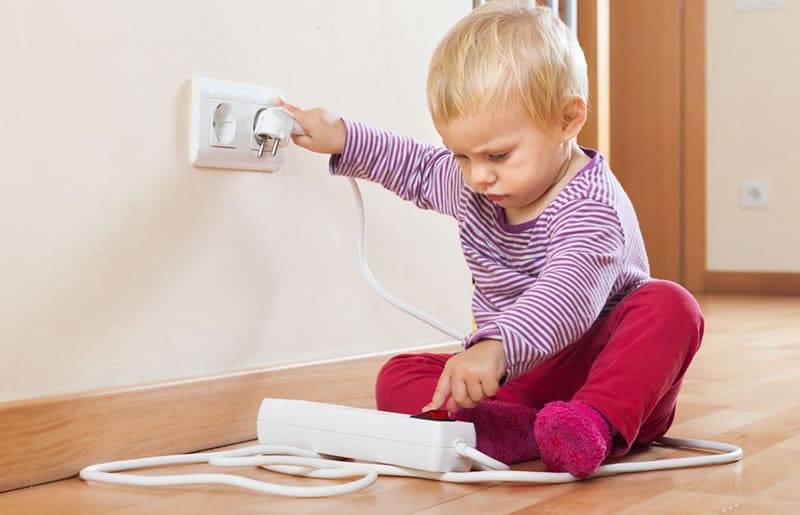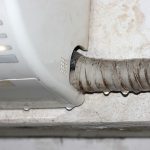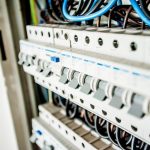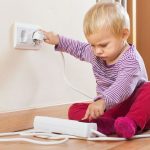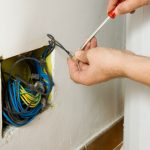Today, we’re way more reliant on electricity in the home than ever before thanks to all of life’s modern devices which most of us enjoy. The trouble is, this reliance on electricity also means there is more chance of electrical hazards occurring.
The good news is that we can all reduce the risk of electrical hazards by staying aware and taking any relevant steps to eliminate any dangers, preferably with the help of your local electrician. Let’s take a closer look at 13 of the most dangerous electrical hazards in the home.
1. Dodgy wiring and defective wires
Number one at the top of the electrical hazards list has to be dodgy or faulty wiring. If you’ve been tempted to have a go yourself at the wiring in the home, then you need to be aware of the importance of good quality wiring which conforms to safety standards to keep yourself and your family safe. Dodgy wiring or wiring that is not up to scratch can raise the chances of electrical fires, power surges, arc faults and other serious electrical issues. For this reason, it’s always best to get a qualified electrician to inspect and replace old electrical wiring around the home.
Old wiring that has corroded worn, cracked, or is damaged in some other way can also increase the risk of electrical accidents. For this reason, it’s important to have an electrician carry out an electrical safety inspection in your home on a regular basis to check that your wiring is safe and to inform you if any wiring needs replacing or upgrading.
2. Pouring water onto an electrical fire
All too often people make the mistake of pouring water onto an electrical fire to put out the flames. This should never be done since it serves to fuel the fire further and could result in electrocution. Instead, keep a fire extinguisher on-site for use in the event of an electrical fire to be used in an emergency. If you don’t have an extinguisher then turn off the electrical power, get everyone out of the house, and call the fire brigade.
3. Placing outlets close to water
It’s important that all outlets in bathrooms, kitchens and other living areas with water are installed a fair distance away from the source of the water. Since water conducts electricity, you can lower the risk of electric shocks by ensuring outlets are away from water. Never ever use a phone, hairdryer, radio, or other electrical devices when you’re in the bath, near your pool, or anywhere that has a wet floor.
4. Wet hands
Expanding on the point above, never ever handle electrical devices with wet hands as this increases the risk of electrical shocks. Make sure your hands are properly dry after getting out of the shower before reaching for your hairdryer.
5. Extension cords
Extension cords are useful when you need that extra length from the power socket to where you want to use your device. However, trailing cords can cause a trip and fall hazard so when using them keep them fixed firmly in position and never use them as a permanent alternative to installing additional powerpoints and outlets.
6. Curious infants
Babies and toddlers tend to be very curious when they’re growing up and like to explore everything around them. Although infants should be supervised by adults at all times, anyone expecting children to their homes can take extra precautions to protect them.
It’s a good idea to replace any electrical outlets that are within their reach and height with extra safe powerpoints that have rotating covers that keep the powerpoints closed when not in use, preventing little ones from sticking their fingers or other sharp objects into the outlets. Unprotected sockets can lead to injury.
7. Lightbulbs
Although you probably don’t regard lightbulbs as electrical hazards there is a large potential for fire when lightbulbs are placed near flammable materials such as drapes, upholstery, beds, and plastics. Lights can cause electrical shocks so make sure you always turn off the switch before replacing a light bulb and never touch it, or the switch with wet hands. In addition, to prevent overheating, be sure to choose a bulb with the correct wattage for the appliance. Also, replace your bulbs with LED lighting that don’t get as hot in use.
8. Old/Damaged Electrical Appliances
Outdated or damaged electrical appliances can pose serious hazards. Frayed cords, exposed wiring, or malfunctioning parts can cause electrical shocks or start fires. It’s essential to replace or repair any appliances showing signs of wear, especially if they generate heat, like electric cooktops, toasters or irons. Regular maintenance and inspection of these devices can prevent potential hazards in the home.
9. Battery Charging
Improper battery charging can lead to overheating, fires, or explosions. Always follow the manufacturer’s instructions when charging devices like smartphones, laptops, or power tools. Avoid leaving them charging for extended periods, particularly overnight. Never use damaged or non-approved chargers, as they can pose significant electrical risks. Avoid covering devices on charge as that can cause excess heat too.
10. Unprotected Outdoor Outlets
Outdoor outlets are exposed to weather elements, increasing the chance of moisture intrusion, which can lead to electric shocks. Make sure outdoor outlets are fitted with proper weatherproof covers and ground fault circuit interrupters (GFCIs) to reduce the risk of water-related electrical incidents.
11. Overloaded Outlets
Plugging too many devices into one outlet or power strip can lead to overheating and electrical fires. Spread out the load across multiple outlets, and avoid using extension cords as a permanent solution. If you consistently need more power, consider having an electrician install additional outlets.
12. Electrical Blankets
Electrical blankets that are old or improperly used can pose a fire risk. Avoid folding or crumpling the blanket, as this can damage the internal wiring. Always follow the manufacturer’s care instructions and never leave an electric blanket on while sleeping or unattended.
13. Wire Chewing Pests
Rodents and pets may chew on electrical wires, which can cause exposed wiring and increase the risk of electrical fires. Regularly inspect areas like basements, attics, or behind large appliances for any signs of damage. If you find chewed wires, contact an electrician for repairs and take steps to keep pests away from your home.
To reduce the risk of death by electric shock, we recommend the installation of a safety switch or RCD (residual current device). If you’d like us to carry out an electrical safety inspection of your home or office then give Static Electrics a call today. Our professional and licensed electrical company has been helping residents and businesses around Brisbane and Sunshine Coast with all manner of electrical issues for many years.

